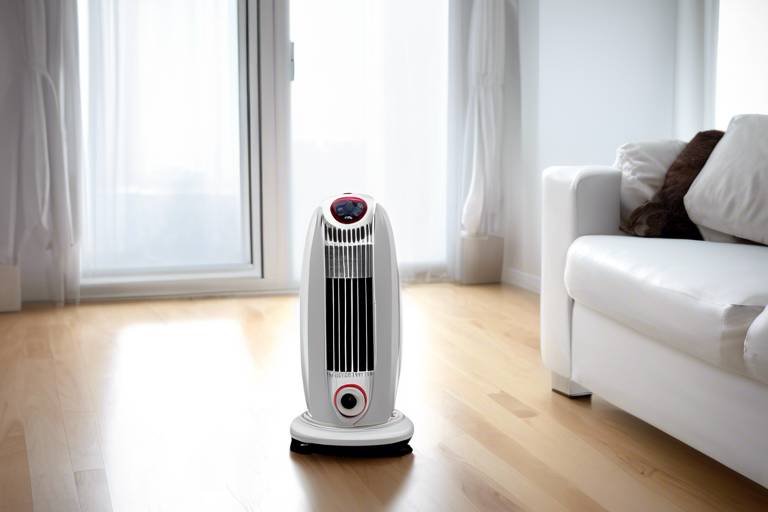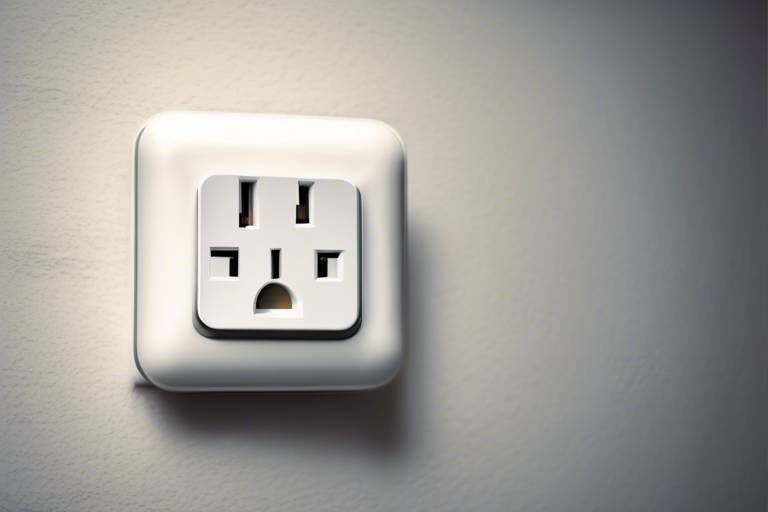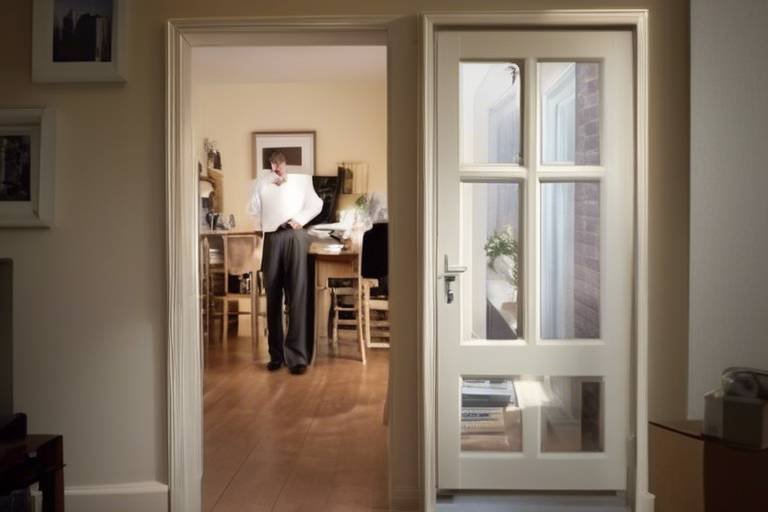Home Security - Wired vs Wireless Systems
In today's world, ensuring the safety of your home is more important than ever. With the rise in crime rates and the increasing value of personal belongings, homeowners are left with a pressing question: how can I effectively secure my home? Enter the debate of wired vs wireless security systems. Each option comes with its own set of advantages and disadvantages, making the decision a bit overwhelming. This article dives deep into the intricacies of both systems, helping you understand their features, installation processes, and the considerations you should keep in mind while enhancing your home security.
When it comes to home security, the stakes are high. Imagine your home being a fortress, where every corner is monitored, and every entry point is secured. Wired systems have long been the traditional choice, offering reliability through physical connections. On the other hand, wireless systems have gained popularity for their convenience and flexibility. So, how do you choose between the two? Let’s break it down!
As you read through this article, think about your own home. Are you looking for something that requires minimal installation hassle, or do you prefer a system that guarantees stability? By the end, you’ll have a clearer picture of which security system suits your needs best. Get ready to explore the world of home security!

Understanding Wired Security Systems
Wired security systems have been around for quite some time and are often regarded as the backbone of home security. These systems utilize physical cables to connect various components, such as cameras, motion detectors, and alarms, to a central control panel. One of the most significant advantages of wired systems is their reliability. Since they are hardwired, they are less prone to interference from other devices, ensuring a stable connection that can be crucial during emergencies.
When considering a wired security system, it's essential to think about the installation requirements. Unlike their wireless counterparts, wired systems typically require professional installation, which can involve running cables through walls and ceilings. This process can be more invasive and time-consuming, but it often results in a more robust security solution. Homeowners should be prepared for potential disruptions during the installation process, as contractors may need to access various areas of the home to lay the necessary wiring.
However, the benefits of wired systems extend beyond just their reliable connections. They are particularly well-suited for larger homes or properties where extensive coverage is needed. In such cases, a wired system can offer comprehensive monitoring capabilities without the risk of signal loss. Moreover, wired systems often come equipped with advanced features, such as video surveillance and integration with other security devices, allowing homeowners to create a more cohesive security network.
To put it simply, if you live in a larger space or want a security system that provides a consistent and dependable connection, a wired security system might be the way to go. While the initial setup can be more complex and costly, the long-term benefits often outweigh these challenges. In the next sections, we'll delve deeper into the advantages of wired systems, the installation process, and the cost considerations that homeowners should keep in mind when making their decision.

Understanding Wireless Security Systems
Wireless security systems have revolutionized the way homeowners approach safety and surveillance. Unlike their wired counterparts, these systems utilize radio signals to transmit data, allowing for a level of flexibility and convenience that is hard to beat. Imagine being able to monitor your home from anywhere in the world, all from the comfort of your smartphone! With advancements in technology, wireless systems have become increasingly sophisticated, offering a variety of features that cater to various security needs.
One of the most enticing aspects of wireless security systems is their ease of installation. Homeowners can often set them up without the need for professional assistance. This means no more drilling holes in walls or running cables through your home. Instead, you can simply place cameras and sensors where you need them and connect them to your home network. This not only saves time but also reduces the overall cost of installation. However, it's essential to consider your home's layout and ensure that your wireless signal can reach all areas where you plan to install devices.
Wireless systems also come with a range of features that enhance their usability. Many modern setups include motion detectors, night vision cameras, and even smart home integration. This means you can connect your security system to other smart devices in your home, like lights and thermostats, creating a cohesive security environment. For instance, if a motion sensor detects movement, it can trigger your smart lights to turn on, illuminating the area and potentially scaring off intruders.
However, despite their many advantages, wireless systems are not without their drawbacks. One major concern is the potential for signal interference. Factors such as thick walls, large appliances, or even neighboring wireless networks can affect the performance of your system. Therefore, it’s crucial to assess the environment where you plan to install your wireless devices. Additionally, since these systems rely on battery power, regular maintenance is necessary to ensure that batteries are charged and functioning properly.
In summary, wireless security systems offer a multitude of benefits, including:
- Flexibility: Easy to install and relocate as needed.
- Smart Integration: Can connect with other smart home devices for enhanced security.
- Remote Monitoring: Access your security feeds from anywhere via your smartphone.
As you weigh your options, consider the unique needs of your home. Wireless systems can be a fantastic choice for those seeking a modern, easy-to-manage security solution.

Advantages of Wired Systems
When it comes to home security, wired systems have a reputation for being the stalwarts of reliability. Imagine a sturdy bridge that stands the test of time, no matter the weather—it’s much like how wired systems operate. They provide a stable connection that is less prone to interference from other devices, making them an excellent choice for homeowners who prioritize consistent performance.
One of the most compelling advantages of wired security systems is their robustness. Because they rely on physical cables, they are not affected by issues like Wi-Fi signal loss or interference from other wireless devices. This means that when you install a wired system, you can rest assured that your security cameras and alarms will function seamlessly. In contrast, wireless systems may experience disruptions, especially in larger homes or areas with many obstacles.
Another significant benefit of wired systems is their security features. Wired connections are inherently more difficult for intruders to tamper with. For instance, if someone were to try to disable your security system, they would have to physically access the cables, which is much more challenging than simply disrupting a wireless signal. This added layer of security provides peace of mind for homeowners, knowing that their property is well-protected.
Wired systems are also well-suited for larger homes or properties where coverage is a concern. In these cases, the ability to run cables throughout the house ensures that every corner is monitored effectively. This is particularly beneficial for properties that may have dead zones where wireless signals struggle to reach. The installation of wired systems allows for comprehensive coverage, ensuring that no area is left vulnerable.
Additionally, the long-term value of wired systems cannot be overlooked. While the initial installation costs may be higher due to equipment and labor, the durability and reliability of these systems often translate into lower maintenance costs over time. Homeowners can expect fewer service calls and repairs compared to their wireless counterparts, making wired systems a wise investment in the long run.
In conclusion, if you're looking for a home security solution that offers reliability, security, and comprehensive coverage, wired systems stand out as a solid choice. They may require a more significant upfront investment, but the benefits they provide can make a substantial difference in safeguarding your home.

Installation Process for Wired Systems
Installing a wired security system can seem like a daunting task, but understanding the process can make it much more manageable. The first step is to assess your home layout. Take a good look at your property and determine where you want to install cameras, sensors, and control panels. This is crucial because it will dictate how much cabling you need and where it should run. Think of it like creating a roadmap for your security system; you want to ensure every corner of your home is covered.
Next, you'll need to gather the necessary materials. This typically includes cables, connectors, a control panel, and various sensors or cameras. Depending on the size of your home, you might also want to consider additional components like a power supply or a backup battery. Always remember that quality matters; investing in durable materials will save you headaches down the line.
Once you have everything ready, the actual installation can begin. This usually involves running cables through walls and ceilings, which can be challenging if you're not familiar with electrical work. If you're comfortable with DIY projects, you might manage this yourself, but many homeowners opt for professional installation to ensure everything is done correctly and safely. A professional can also help with the complicated task of connecting the system to your home's electrical wiring.
After the physical installation, it's time to set up the system. This includes connecting all the components to the control panel and configuring the software. Most modern systems come with user-friendly interfaces, making it easy to customize settings according to your preferences. Think of this as the final touch-up; just like painting a room, it’s where you get to add your personal flair!
Finally, always conduct a thorough test of the system to ensure everything is functioning correctly. Walk around your home and check each sensor and camera to confirm that they are responding as expected. It's like a dress rehearsal before the big show; you want to ensure everything is in place before relying on it for your security.
In summary, while the installation process for wired systems can be intricate and labor-intensive, breaking it down into manageable steps can make it less overwhelming. Whether you choose to tackle it yourself or hire a professional, the peace of mind that comes with a well-installed security system is undoubtedly worth the effort.
- How long does it take to install a wired security system? The installation time can vary greatly depending on the size of your home and the complexity of the system. On average, it can take anywhere from a few hours to a couple of days.
- Do I need a professional to install my wired security system? While some homeowners are comfortable with DIY installations, hiring a professional is often recommended for optimal safety and functionality.
- Can I upgrade my wired system in the future? Yes! Wired systems are generally modular, meaning you can add more cameras or sensors as needed.

Cost Considerations for Wired Systems
When it comes to investing in a wired home security system, it's essential to weigh the initial costs against the long-term benefits. Wired systems typically require a higher upfront investment compared to their wireless counterparts. This is primarily due to the need for professional installation, which involves running cables through walls and ceilings, and the purchase of equipment that may be more expensive. However, many homeowners find that this initial expense pays off in the long run.
One of the significant advantages of wired systems is their durability and reliability. Once installed, they tend to require less maintenance and are less susceptible to interference and hacking. This stability can lead to fewer false alarms and a more consistent level of security, which is particularly valuable for larger homes or properties with complex layouts. The peace of mind that comes from knowing your system is operating without interruption can be worth the extra cost.
To give you a clearer picture, let’s break down the costs associated with wired security systems:
| Cost Component | Estimated Cost |
|---|---|
| Equipment (Cameras, Sensors, etc.) | $500 - $2000 |
| Installation (Professional Services) | $200 - $1000 |
| Monthly Monitoring Fees | $30 - $60 |
| Maintenance and Repairs (Annual) | $100 - $300 |
As shown in the table, the initial costs can add up quickly. However, it’s important to remember that wired systems often have a longer lifespan than wireless systems, which may require more frequent updates and replacements. Additionally, many wired systems come with comprehensive warranties, further enhancing their value.
Another factor to consider is the potential for savings. While the upfront costs might be higher, the reliability of a wired system can lead to lower insurance premiums. Insurance companies often offer discounts for homes equipped with robust security measures, meaning you could recoup some of your initial investment over time.
In summary, while the costs associated with wired security systems can be daunting at first glance, the long-term benefits—such as reliability, reduced maintenance, and potential insurance savings—make them a worthwhile consideration for many homeowners. If you're serious about securing your home, investing in a wired system may be the way to go.

Advantages of Wireless Systems
When it comes to home security, wired systems have long been the traditional choice. However, the rise of wireless systems has revolutionized the way homeowners think about security. One of the most significant advantages of wireless systems is their ease of installation. Homeowners can often set them up without needing a professional, which not only saves money but also allows for immediate security enhancements. Imagine being able to install a security camera in just a few minutes without having to drill holes or run cables through your walls!
Another compelling benefit is the flexibility that wireless systems offer. Because they rely on radio signals rather than physical connections, homeowners can easily relocate devices as needed. This is particularly useful for those who might want to change their home layout or add new features over time. Want to move that camera from the front porch to the backyard? No problem! This adaptability makes wireless systems an excellent choice for renters or those who frequently rearrange their living spaces.
Additionally, wireless systems are typically scalable. This means that you can start with a basic setup and expand your security system as your needs change. For instance, you might begin with a few door sensors and a camera, and later add motion detectors or smart locks. This scalability allows homeowners to invest in their security gradually, making it easier to manage costs while still enhancing protection.
Moreover, many wireless security systems come equipped with smart technology. This means they can integrate seamlessly with other smart home devices, such as lights, thermostats, and voice assistants. Imagine being able to control your entire home security system with just your voice or through a smartphone app! This level of integration not only enhances convenience but also provides a more comprehensive approach to home security.
However, it’s important to acknowledge that wireless systems do have their challenges. For example, they can be susceptible to interference from other wireless devices or physical barriers like walls. Yet, advancements in technology are continually addressing these issues, making wireless options more reliable than ever. In fact, many modern systems now come with features that help mitigate these risks, such as dual-band capabilities and enhanced encryption for data security.
In summary, the advantages of wireless home security systems are clear. Their ease of installation, flexibility, scalability, and smart technology integration make them an attractive choice for many homeowners. As you evaluate your options, consider how these benefits align with your personal needs and lifestyle.

Installation Process for Wireless Systems
Installing a wireless security system can be an exciting DIY project that enhances your home’s safety without the hassle of complicated wiring. Unlike wired systems that often require professional installation, wireless systems are designed for simplicity and convenience. So, how do you get started? First, you’ll want to gather your tools and equipment. Typically, you’ll need a drill, screwdriver, and a smartphone or tablet to connect to the system's app.
Once you have everything ready, the first step is to choose the right location for your cameras and sensors. Think about areas that need the most protection, such as entry points, driveways, or backyards. It’s crucial to ensure that these devices have a strong signal to the main control panel, which often connects to your home Wi-Fi. You might want to do a quick signal test with your smartphone in the proposed locations to avoid any connectivity issues later on.
Next, you’ll want to install the main hub or control panel. This device is the brain of your security system, so place it in a central location within your home. Most systems come with adhesive mounts or screws for easy installation. After the hub is set up, it’s time to connect your devices. Follow the manufacturer’s instructions to add cameras, motion detectors, and door/window sensors to your system. This usually involves scanning QR codes or entering codes through the app.
One of the most significant advantages of wireless systems is their flexibility. You can easily reposition the devices if you find they aren’t covering the areas you want. Just remember to check the battery levels regularly, as many wireless devices run on batteries. Some systems even send alerts when battery life is low, so you won’t be left in the dark.
Lastly, once everything is installed, don’t forget to test your system thoroughly. Walk around your home to ensure that all sensors are functioning correctly and that you receive alerts on your smartphone. This step is crucial to ensure that your system is working as intended and provides the security you need.
To summarize, the installation process for wireless systems is straightforward and can be done by most homeowners. With the right tools and a little planning, you can enhance your home security in no time!
- Can I install a wireless security system by myself? Yes, most wireless systems are designed for easy DIY installation, requiring minimal tools.
- How do I ensure my wireless system has a strong signal? Choose locations for your devices that are close to the main hub and test the signal strength with your smartphone before finalizing placements.
- What happens if the battery in my wireless device dies? Many systems will send you an alert when battery levels are low, allowing you to replace them in time.
- Can I add more devices to my wireless system later? Absolutely! Most wireless security systems allow you to add devices as needed, providing flexibility for your security needs.

Comparing Security Features
When it comes to securing your home, the features of your security system can make all the difference. Both wired and wireless systems offer a variety of functionalities, but they do so in different ways. Let’s dive into the key features that you should consider when comparing these two types of systems, and how they can impact your overall security.
Wired systems are often seen as the traditional choice, known for their reliability and stability. They typically provide a consistent connection, which is crucial for features like video surveillance and alarm systems. The wiring creates a direct line of communication, making it less likely for signals to be interrupted. On the other hand, wireless systems are celebrated for their flexibility and ease of installation. They use radio signals to transmit data, which means you can easily relocate cameras or sensors without the hassle of rewiring.
One of the standout features of modern security systems is remote monitoring. Both wired and wireless systems can offer this capability, allowing homeowners to keep an eye on their property from anywhere using a smartphone or computer. However, wireless systems tend to excel in this area due to their ability to connect with various smart home devices. Imagine being able to check your security cameras while sipping coffee at your favorite café—that's the convenience wireless technology brings to the table.
In terms of integration with smart home devices, wireless systems have a clear advantage. They can easily connect to smart locks, lights, and even voice assistants like Amazon Alexa or Google Assistant. This means you can create a fully automated home that responds to your commands. Wired systems, while they can also offer integration, often require more complex setups and may not be as seamless as their wireless counterparts.
Another important consideration is security features such as video surveillance, motion detection, and alarm notifications. Most modern systems come equipped with these features, but the implementation can vary. For instance, wired systems often have higher-quality cameras that deliver clearer images, especially in low-light conditions. In contrast, wireless systems might offer more advanced motion detection technologies, reducing false alarms and providing quicker alerts to homeowners.
| Feature | Wired Systems | Wireless Systems |
|---|---|---|
| Reliability | High - Less interference | Moderate - May experience signal loss |
| Installation | Complex - Requires professional help | Easy - DIY options available |
| Integration with Smart Devices | Possible but complex | Highly compatible |
| Video Quality | High - Generally superior | Variable - Depends on the camera |
| Mobility | Limited | High - Easily relocatable |
Ultimately, the choice between a wired or wireless security system comes down to your specific needs and preferences. If you prioritize stability and have a larger property, a wired system might be the way to go. However, if you value flexibility and the ability to integrate with other smart home devices, a wireless system could be the better choice. By weighing these features against your lifestyle and security requirements, you can make an informed decision that best protects your home.
Here are some common questions homeowners have when choosing between wired and wireless security systems:
- What is the main difference between wired and wireless security systems? Wired systems use physical cables for connectivity, while wireless systems rely on radio signals.
- Are wireless systems less secure than wired systems? Not necessarily. While wired systems are generally more stable, modern wireless systems have advanced security features that can make them just as secure.
- Can I install a wireless security system myself? Yes, many wireless systems are designed for easy DIY installation, making them accessible for most homeowners.
- What should I consider when choosing a security system? Consider factors like your budget, home layout, the level of integration with smart devices, and your specific security needs.

Choosing the Right System for Your Home
When it comes to selecting the ideal home security system, the decision can feel overwhelming. With so many options available, how do you know which one is best for your specific needs? Choosing the right system isn't just about picking the latest gadget; it's about understanding your unique circumstances and what you want to achieve in terms of security. Here are some key factors to consider:
1. Budget: Your budget plays a crucial role in determining the type of system you can afford. Wired systems often come with higher upfront costs due to installation and equipment, while wireless systems may offer more affordable options. However, think about the long-term value as well. A higher initial investment in a wired system could save you money in the long run due to its durability and lower maintenance needs.
2. Home Layout: The layout of your home can significantly influence your choice. For larger homes with multiple floors, a wired system might provide the stable connection and coverage you need. On the other hand, if you live in a smaller space or plan to move frequently, a wireless system offers the flexibility to easily relocate and expand your security measures.
3. Personal Preferences: Do you prefer a DIY approach, or are you comfortable hiring professionals? If you enjoy hands-on projects, a wireless system may be right up your alley, as many can be installed without professional help. Conversely, if you want a hassle-free experience, a wired system might be worth the investment in professional installation.
4. Security Features: Evaluate the specific features that come with each system. For example, many wireless systems integrate seamlessly with smart home devices, allowing for remote monitoring via smartphone apps. Wired systems, while sometimes lacking in smart technology, often provide robust security features and reliable performance.
Ultimately, the decision should reflect your lifestyle and security needs. Consider creating a comparison table to weigh the pros and cons of each option based on your priorities. Here’s a simple example:
| Factor | Wired Systems | Wireless Systems |
|---|---|---|
| Cost | Higher upfront cost | More affordable options |
| Installation | Professional installation often required | DIY-friendly |
| Reliability | Stable connections | Can be affected by interference |
| Flexibility | Less flexible, fixed installation | Highly flexible, easy to relocate |
| Integration | Limited smart home integration | Excellent integration with smart devices |
In conclusion, the right security system for your home is one that aligns with your budget, fits your home layout, meets your personal preferences, and incorporates the security features you desire. Take your time to evaluate your options, and don’t hesitate to consult with security professionals for tailored advice. After all, investing in your home’s security is an investment in your peace of mind.
Q1: Can I switch from a wired to a wireless system later?
A1: Yes, many homeowners choose to upgrade or switch their systems as their needs change. However, be mindful of the compatibility of devices and features.
Q2: How do I know if my home is suitable for a wired system?
A2: Homes with existing wiring or those that are larger in size often benefit from wired systems. A professional assessment can help determine the best fit.
Q3: What maintenance do wireless systems require?
A3: Wireless systems typically require battery replacements and regular software updates to ensure optimal performance.
Frequently Asked Questions
- What are the main differences between wired and wireless security systems?
Wired security systems rely on physical cables for connectivity, offering stability and reliability. In contrast, wireless systems use radio signals, providing flexibility and easier installation. The choice depends on your specific needs and home layout.
- Are wired security systems more secure than wireless ones?
Generally, wired systems are considered more secure because they are less susceptible to interference and hacking. However, modern wireless systems have advanced encryption and security protocols that can also provide a high level of protection.
- Can I install a wired security system myself?
Installing a wired security system typically requires professional assistance due to the need for running cables throughout your home. It's a more complex process compared to wireless systems, which can often be set up by homeowners.
- What are the installation requirements for wireless security systems?
Wireless systems are relatively easy to install. Most come with user-friendly instructions, and you usually just need basic tools like a screwdriver. The biggest requirement is ensuring a good Wi-Fi connection throughout your home.
- How do the costs compare between wired and wireless systems?
Wired systems often have higher upfront costs due to installation and equipment expenses. Wireless systems can be more budget-friendly initially, but it's essential to consider long-term costs, including subscription fees for monitoring services.
- What security features should I look for in a home security system?
Look for features such as video surveillance, motion detection, remote monitoring, and integration with smart home devices. Both wired and wireless systems offer various functionalities, so choose what best fits your lifestyle.
- How do I choose the right security system for my home?
Consider factors like your budget, home layout, and specific security needs. If you have a larger property, a wired system might be more suitable, while a smaller or rental property might benefit from the flexibility of a wireless system.
- Can I integrate my security system with other smart home devices?
Yes, many modern security systems, especially wireless ones, can integrate seamlessly with smart home devices like lights, locks, and thermostats, allowing for enhanced automation and control.



















